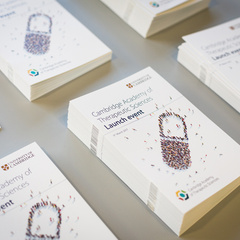30 Jun 2017
Milner Therapeutics Institute: a drug discovery ecosystem
29 Jun 2017
Drugs: how to pick a winner in clinical trials
28 Jun 2017
How to train your drugs: from nanotherapeutics to nanobots
26 Jun 2017
Computer-designed antibodies target toxins associated with Alzheimer’s disease
26 Jun 2017
The bug hunters and the microbiome
21 Jun 2017
Apollo's mission to drive therapeutic innovation
21 Jun 2017
Patching up a broken heart
21 Jun 2017
Cambridge start-up raises £40 million in funding to develop new cancer treatments
15 Jun 2017
Take your medicine: how research into supply chains will help you take care of yourself
13 Jun 2017
Future therapeutics: the hundred-year horizon scan
20 Apr 2017
Repurposing existing drugs may provide new dementia treatments
29 Mar 2017
Elysium Health joins Milner Therapeutics Consortium
27 Mar 2017
£5 million gift from Cambridge alumnus to further dementia research
21 Mar 2017
Cambridge Academy of Therapeutic Sciences opens for business

13 Mar 2017
A myriad of opportunities to explore therapeutic sciences at #CSF2017
